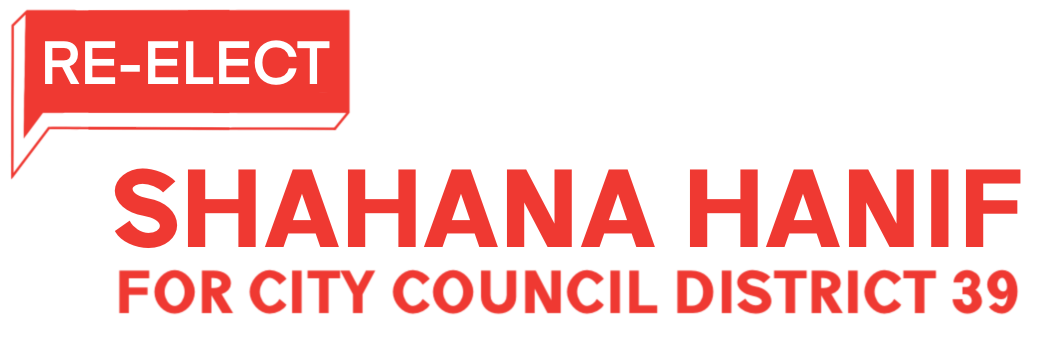CONFRONTING HATE
In 2019, Shahana got a call from her neighbors after a group of Bangladeshi Muslim boys were picked up by the local precinct for throwing eggs at their Jewish neighbors. The vandalism was harmful and Shahana saw how leaning on the police to respond to this hate could further escalate tension in the neighborhood, making everyone less safe. Taking a retributive approach and incarcerating these boys does not prevent cycles of harm and educate our communities. Instead, Shahana quickly brought together a coalition of neighbors and organizations including Jews for Racial and Economic Justice (JFREJ), Desis Rising Up & Moving (DRUM), and the Center for Anti-Violence Education. This coalition mobilized to educate our neighbors about the impact of hate and anti-Semitism, sending teams of Muslim and Jewish neighbors into Borough Park and Kensington to speak with neighbors and businesses directly about hate violence in Bangla and Yiddish. Restorative justice is hard work: it’s much easier to call the cops and leave our neighbors behind. But as anti-Asian, anti-immigrant, and anti-Black violence continue to escalate in our city, we need community-led and non-carceral solutions to violence, and create real alternatives to calling the police.
Solidarity work means rejecting efforts to expand the power and scope of the NYPD as a solution to end hate or discrimination. The NYPD does not stop targeted violence against our community members: they are often the perpetrators of harm in our neighborhoods, and fail to offer needed de-escalation and urgent solutions, like mediation between neighborhood-specific disputes. Instead, Shahana will fight to divest from the NYPD, and reinvest our public dollars into programs that address the root causes of violence — including quality housing, union jobs, and public education. None of these suggestions are radical: most of them happen already in our communities, at protests, and in our religious centers. She will work to make our streets truly safe, by investing in physical infrastructure like street lamps, supporting political education oriented groups like JFREJ, DRUM, and the Center for Anti-Violence Education, and creating new community-driven programs like the Neighborhood Stewardship Initiative, which will provide paid jobs for young people and community members to keep our streets open and welcoming.
As Council Member, Shahana will...
+ Address the immediate impacts of hate violence
- Use the district office as a hotline and hub for resources and referrals for survivors and anyone in crisis, and invest in mediation and de-escalation services to resolve community conflicts.
- Create City-funded emergency grant programs to support survivors of abuse access money for rent, health needs, and lost wages. Survivors of violence should not have to crowdfund to cover costs of health care or housing.
- Reimagine 311 as a tool to provide coordinated care for individuals harmed by acts of violence. Our City should mobilize around those harmed, and connect them with NYC Care, mental health services, meal delivery and community fridges, and housing.
- Work with religious institutions to develop protocols for navigating violence in the community without calling the police, including de-escalation strategies, self-defense and Know Your Rights training, and creating phone trees.
- Create frameworks for the Department of Transportation and community organizations to provide assistance and safety plans for faith based institutions in advance of religious community events in public spaces, rather than relying on the NYPD for security.
- Increase funding for the Commission on Human Rights, so that organizers and community based organizations have disaggregated data about violence, and restore funding for the Hate Crimes Prevention Initiative.
+ Build a truly safe New York City
- Create more public restrooms and water fountains, in partnership with the Department of Parks and Recreation, Department of Transportation, and Department of City Planning.
- Increase funding for maintenance of existing restrooms.
- Open restrooms for 24 hours.
- Work with the Department of Parks and Recreation to remove “hostile architecture” from the City’s public parks and plazas, and increase park benches, clear signage, water fountains, and other community infrastructure.
- Work with the Department of Transportation to create sufficient lighting along sidewalks, in parks and public spaces, and at bus stops and subway stations.
- Increase sanitation budgets to fund mid-street trash cans.
- Increase and sustain funding to the Department of Cultural Affairs. Work with cultural orgs to bring community art into the District, supporting organizations that need resources by providing discretionary funding, demystifying the permit process, and regularly attending cultural programming.
- Fund Safer Streets Initiatives, or programs that make streets safer for pedestrians and cyclists. Aside from existing weekend walks and summer streets promoted by NYC’s DOT, this includes funding and encouraging street vendors, neighborhood block parties, fruit trees, sidewalk art, street furniture, and promoting safe access to play spaces
- Expand police free Open Streets in the City, particularly in neighborhoods of color with fewer public spaces.
- Create a new Neighborhood Stewardship Initiative, a program which would hire residents and create new green union jobs to ensure open streets remain truly open with clear barricades, signage, and no police presence, instead of relying on volunteer labor to keep open streets lively.
- Partner with Business Improvement Districts (BIDs) to hire Neighborhood Stewards to provide community safety, instead of hiring private security and police.
+ Strengthen community solidarity
- Fund restorative justice programs in public schools, like the Brooklyn Community Foundation’s Brooklyn Restorative Justice four-year pilot project, which reduced school suspensions and increased student wellbeing.
- Host community town halls and spaces to process incidents of violence and harm in public spaces within the district.
- Expand and fund the development of culturally responsive pedagogy and civic education across all our public schools.
- Create a hotline out of the district office in partnership with the Department of Small Businesses to address suspected fraud, trafficking, or other public safety issues.
- Introduce legislation to completely remove Nuisance Abatement Laws (NALs), which historically weaponize immigrant-owned businesses to monitor and police Black communities.
- Host regular upstander intervention workshops across the district.
